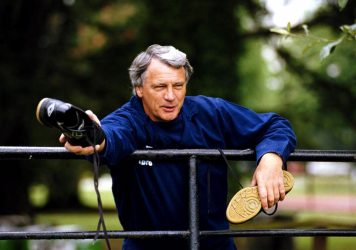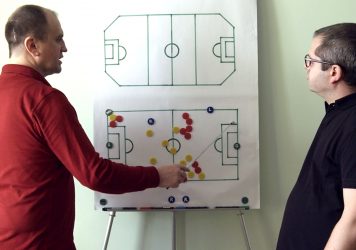The story of one of England’s (and Ireland’s) most beloved footballing sons becomes a sombre portrait of dementia.
Jack Charlton’s career was defined by his success on football’s biggest stage. As a player he famously lifted the Jules Rimet trophy alongside younger brother Bobby at the World Cup in 1966, while as a head coach he led the Republic of Ireland’s men’s national side to its first major international tournaments, culminating in their unlikely defeat of Italy in the group stages of USA ’94.
Finding Jack Charlton recounts these triumphs with the kind of wistful romanticism one expects from a film about a great of the beautiful game. Things were a lot different back in Jack’s day: men were men, footballers were tough, and managers tended to be hard-drinking, straight-talking and single-minded. These traits are hardly scrutinised here; archival footage and first-hand testimony given by various family members, former players and colleagues consolidates the popular image of the cheeky lad from Ashington who did it his way, achieving sporting immortality through sheer force of will.
Access to thousands of hand-scrawled notes, which Jack made throughout his career, enables directors Gabriel Clarke and Pete Thomas to provide insight into what motivated him on and off the pitch. Charlton, they argue, was an astute tactician and a compassionate, if uncompromising, man manager. Ex pros from Paul McGrath to Andy Townsend speak fondly of a no-nonsense coaching philosophy that now seems ahead of its time. It was not for his good nature and wry sense of humour alone that Charlton became adored on both sides of the Irish Sea: he was undoubtedly a pragmatic and savvy practitioner.
But there’s another side to this story. Filmed during the last 18 months of Charlton’s life (he passed away on 10 July of this year), this is first and foremost a portrait of a fading icon. Shifting the focus away from football, the film reveals Charlton to be in the late stages of dementia, brought on by a previously undocumented diagnosis of Alzheimer’s. Rarely has the day-to-day reality of this terrible disease been laid bare in such intimate, heart-wrenching detail – certainly not in the context of a valedictory sporting biography.
There is an acute sadness that comes with witnessing the end of a journey like this. At his home, surrounded by loved ones and mementos of his glory days, Charlton appears relaxed and cheerful as ever, but it’s clear that by this point his memories were already lost to him. The glint in his eye has gone. Having personally experienced seeing a close relative succumb to dementia, however, I’m slightly uncomfortable about the way this documentary frames Jack’s condition as a challenge, as though it is a battle to be won or lost. The truth is that the effects of this cruel illness are beyond anyone’s control.
Charlton reached the summit of his sport with a smile on his face and touched countless lives in the process. He was a fearless centre half, a shrewd and gracious coach and, above all, a champion. Perhaps it’s best for ordinary fans like me, who could never claim to have really known the man, to remember him that way.
Published 16 Nov 2020
Another authorised bio of a football legend.
Almost too sad to bear.
A timely tribute to a genuine great of the game.

This evocative documentary celebrates the life and career of one of football’s true greats.

Documentaries like Becoming Zlatan are the new must-have accessory for celebrity footballer everywhere, but do they capture why we love them?

One man’s soccer obsession becomes a humble plea for a better world in Corneliu Porumboiu’s riveting documentary.